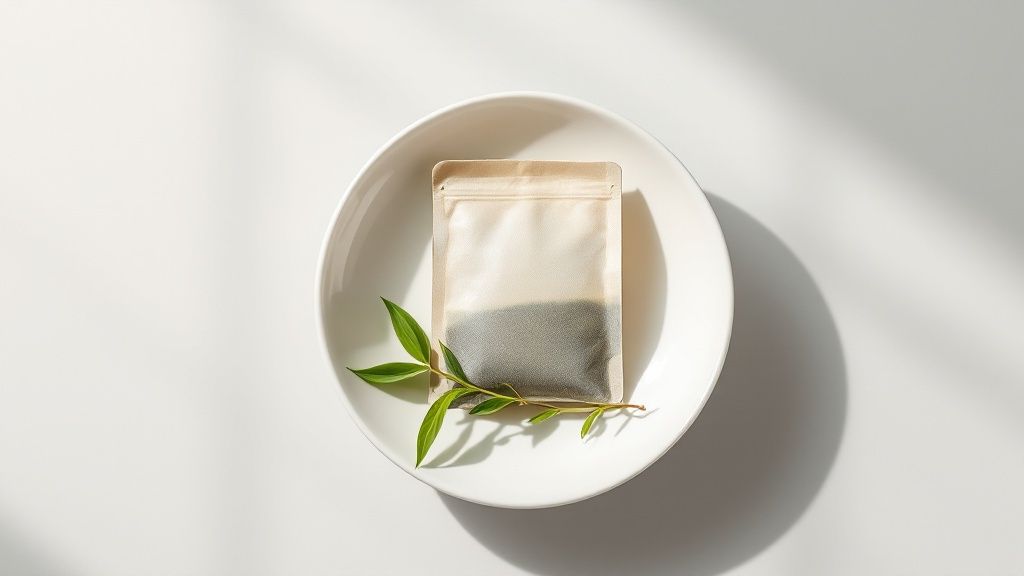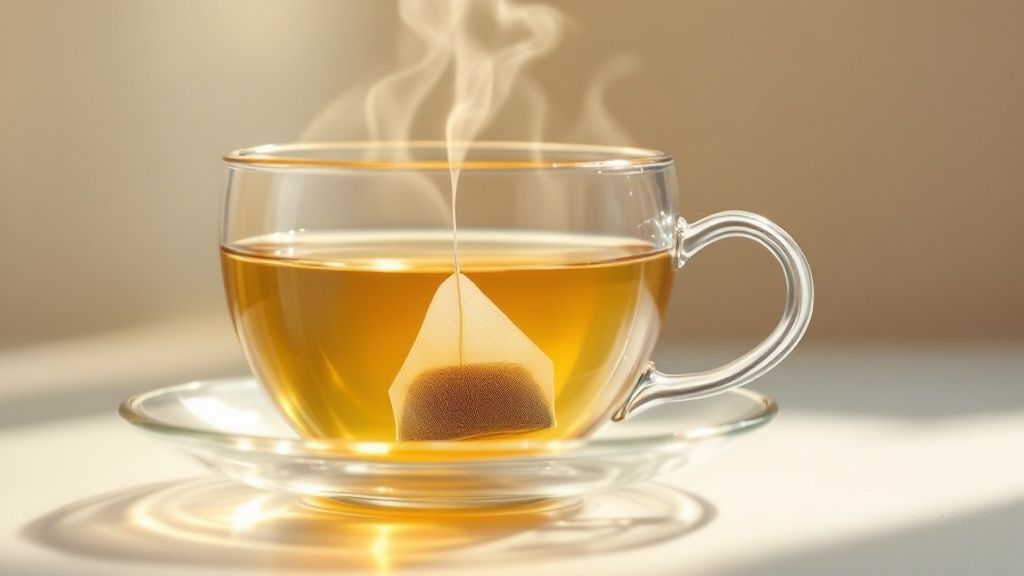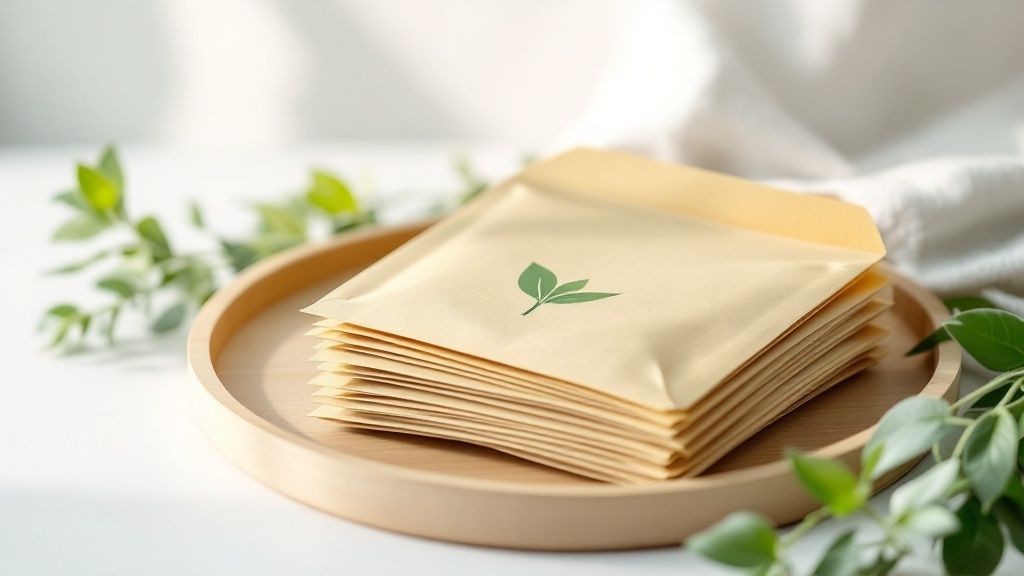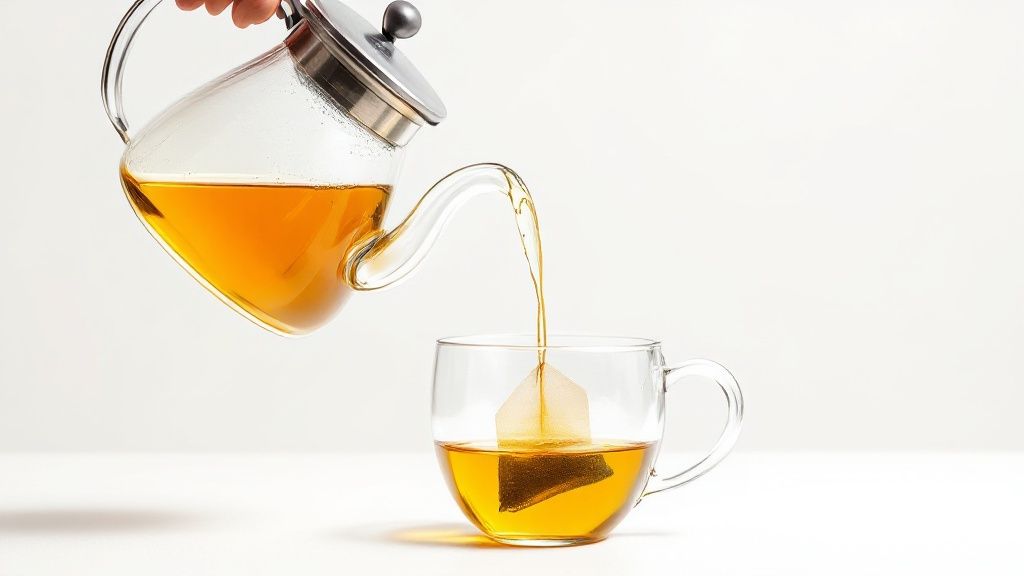At its heart, an organic tea bag is simple: it’s filled with tea grown without any synthetic pesticides or fertilisers. This approach is all about working with nature, not against it, from the soil right through to your cup. The result is a cleaner, more authentic brew.
The Journey of an Organic Tea Bag

When you spot the word 'organic' on a box of tea, it signals a commitment that goes much deeper than just the leaves inside. Think of it as the difference between a lovingly tended allotment and a vast, industrial farm. The journey of a proper organic tea bag begins with the very earth it grows in.
The whole process is built on a philosophy of ecological balance and respect for the land. Farmers follow strict standards, which means no synthetic pesticides, herbicides, or artificial fertilisers. Instead, they turn to time-honoured, natural methods to nurture the tea plants and keep the soil healthy.
What Organic Farming Really Means
At its core, organic tea cultivation is about creating a thriving, self-sustaining ecosystem. Rather than reaching for chemical quick-fixes, farmers use techniques that have been refined over generations to produce healthy, resilient crops. This doesn't just protect the tea; it supports the entire surrounding environment.
A few key practices include:
- Natural Pest Control: Instead of spraying chemicals, they encourage helpful insects like ladybirds to manage pests naturally.
- Soil Enrichment: They use compost and other natural matter to build up rich, fertile soil, giving the tea plants all the nutrients they need to flourish.
- Biodiversity: You'll often see other crops planted around the tea fields. This promotes a balanced ecosystem and helps prevent soil erosion.
This dedication means the tea leaves grow without being exposed to potentially harmful chemical residues. What you get is a cleaner, purer leaf that truly captures the tea's natural flavour.
"Choosing organic is more than a preference; it's a conscious decision to support farming practices that prioritise the health of the soil, the biodiversity of the ecosystem, and the purity of the final product in your cup."
A Growing Movement Towards Purity
More and more of us want to know where our food comes from, and this is completely reshaping the tea industry. Here in the UK, people are actively seeking out organic tea bags, driven by a desire for healthier options and a closer connection to what they consume. This isn't just a fleeting trend; it's a real shift in the market.
The demand for organic tea is set for some serious growth, reflecting a global move towards health-conscious and sustainable products. Projections show that by 2025, tea bags will make up 34% of the organic tea market. Looking further ahead, the global organic tea market is expected to grow from USD 1,404.9 million in 2025 to a staggering USD 3,089.6 million by 2035, which is a strong compound annual growth rate of 9.6%. You can dive deeper into these trends in the full organic tea market report.
This growth shows that as organic choices become more convenient and accessible, more and more people are making the switch.
The Real Health Benefits of an Organic Brew

Choosing an organic tea bag is about so much more than a feel-good purchase. It’s a direct upgrade for your health, moving beyond vague wellness claims to offer some pretty tangible advantages. When you pop an organic tea bag into your mug, you’re not just brewing tea; you're ensuring your daily cuppa is free from a whole host of synthetic chemicals.
Think about it. Conventional tea farming often leans heavily on pesticides, herbicides, and fungicides to keep crops tidy. Tiny residues of these can cling to the tea leaves right through processing and drying, potentially ending up in your brew. Going organic neatly sidesteps that entire issue.
More of the Good Stuff: Antioxidants
It’s not just about what you’re avoiding, but what you’re gaining. Tea grown organically often packs a bigger punch when it comes to the beneficial compounds we drink it for in the first place. These plants are raised in nutrient-rich soil, growing at their own pace without chemical prodding. This encourages them to build up their own natural defences, and that process results in higher levels of antioxidants.
Organic green teas, for example, are famous for their high concentration of catechins, especially one called epigallocatechin gallate (EGCG). These are powerhouse antioxidants, brilliant at tackling what's known as oxidative stress in the body.
What is oxidative stress? In simple terms, it's the damage caused by unstable molecules called free radicals. Antioxidants are like your body's personal security team, stepping in to neutralise these troublemakers and protect your cells. This helps support your immune system and overall long-term health.
So, that comforting mug of organic tea isn't just a ritual. It’s an active dose of plant-powered goodness, giving you more of what makes tea so brilliant for you.
Purer Flavour, Better Experience
This lack of chemical residue doesn't just do your body good—it completely transforms the taste. Ask any tea lover, and they’ll likely tell you that organic teas have a cleaner, brighter, and more authentic flavour. Without the subtle background noise of agricultural sprays, the true personality of the tea leaf—its unique terroir—can really sing.
This purity makes the whole experience far more enjoyable. It also helps explain why organic herbal infusions are booming. Here in the UK, the herbal tea market is on a steady climb, with forecasts predicting a growth rate of around 4.13% CAGR between 2025 and 2035. Blends featuring chamomile, ginger, and turmeric are leading the charge as people seek them out for everything from cognitive support to better digestion and relaxation. You can read more about the rising demand for herbal teas in the UK market.
It’s a simple connection: a purer tea offers a more direct route to the wellness benefits we're all looking for.
A Simple Step for Your Well-being
Switching to organic tea bags is such an easy win for your health. You’re choosing a cleaner brew, free from synthetic residues and potentially loaded with more health-boosting antioxidants.
To put it simply, here’s what you get:
- No Synthetic Pesticide Residue: Sip away with the peace of mind that your tea is free from unwanted chemicals.
- Higher Antioxidant Levels: Organic farming can encourage tea leaves to produce more beneficial compounds like catechins.
- Authentic, Cleaner Taste: You get to experience the true, unadulterated flavour of the tea, making for a much better cuppa.
- Supports a Healthy Lifestyle: It’s a natural and enjoyable way to boost your daily intake of plant-based nutrients.
Ultimately, every time you reach for an organic tea bag, you’re making a small but powerful investment in your health, ensuring your daily ritual is as pure and beneficial as it can be.
How to Decode Certifications on Your Tea Box

When you're browsing the tea aisle, it’s easy to get lost in a sea of symbols and logos splashed across the boxes. Words like 'natural' or 'pure' sound lovely, but they don't have the same clout as a proper certification. These official seals are your guarantee that what’s inside the box meets incredibly strict, legally-defined standards.
Think of these certifications as a passport for your tea. They're proof that it has been through rigorous checks at every step of its journey, from the soil of the tea garden right through to the final packaging. Getting to know these logos is the secret to choosing your organic tea bags with complete confidence.
This little guide will walk you through the most common certifications you’ll spot on tea here in the UK, helping you see past the marketing fluff and understand exactly what you're buying.
The Key Organic Players in the UK
When you pick up a box of organic tea, a few key logos act as your promise of quality and authenticity. Each one shows a commitment to a specific set of high standards, all verified by an independent body.
Here are the main ones to look for:
- The Soil Association Logo: This is one of the most trusted organic symbols in the UK. If you see this logo, you know the product has met some of the highest organic standards in the world, often going above and beyond the baseline legal requirements for animal welfare and environmental care.
- The EU Organic Leaf: This green leaf, made up of little stars, is the official organic logo for the European Union. Its presence guarantees the tea contains at least 95% organic ingredients and has followed strict rules on how it was grown, processed, and inspected.
- USDA Organic: Though it’s an American standard, you'll often see this logo on teas imported into the UK. It confirms the product meets the tough organic regulations set by the United States Department of Agriculture, which are broadly similar to the EU’s rules.
Spotting one of these logos means the product isn't just saying it's organic; it's been independently proven. To get a better grasp on what goes into these labels, it's worth reading up on the importance of organic certifications.
Beyond Organic to Ethical Sourcing
While organic certifications are all about how the tea is grown, another important set of logos tells you about the people behind your daily brew. Ethical certifications are there to make sure the farmers and workers who produce the tea are treated fairly.
These logos focus on the social and economic side of the tea trade.
"An ethical certification is a promise. It promises that the farmers received a fair price for their crop, that workers have safe conditions, and that the community benefits from the trade, often through investments in local schools or healthcare."
The most recognisable ethical logos include:
- Fairtrade Mark: This is probably the most widely known ethical label out there. It certifies that the product meets international standards for fair pay, safe working conditions, and environmental protection. A brilliant part of the Fairtrade system is the Fairtrade Premium, an extra bit of money paid to producers so they can invest in their own community projects.
- Rainforest Alliance Certified: You’ll recognise this one by its frog seal. This certification focuses on three pillars of sustainability: social, economic, and environmental. It ensures farms protect biodiversity, look after natural resources, and promote the rights and well-being of their workers.
When you choose organic tea bags that also carry an ethical certification, you’re making a really powerful choice. You’re not just supporting a system that’s kinder to the planet, but one that’s fairer to the people who grow our tea. It's a choice that helps make every part of the journey, from the field to your cup, a positive one.
The Hidden Problem Lurking in Your Tea Bag

A truly sustainable cuppa is about more than just the tea leaves. The humble tea bag itself—along with its string, tag, and box—plays a surprisingly big part in the environmental story of your daily brew. Many of us pop our used tea bags straight into the compost, assuming they’ll break down naturally. But the reality is often far more complicated.
The problem lies in a sneaky, hidden ingredient that most conventional tea bags use to hold themselves together: plastic. A tiny amount of polypropylene is used as a heat-sealant, and while it seems insignificant, it’s enough to stop the bag from fully decomposing.
Instead of turning into rich, healthy soil for your garden, these bags leave behind a trail of microplastics. These tiny fragments can contaminate the ground, get washed into rivers and oceans, and cause real harm to wildlife. It’s a discovery that has, quite rightly, made many of us rethink what’s really in our mug.
That Pesky Hidden Plastic
Polypropylene is everywhere because it’s cheap and it works. It effectively seals the paper fibres, but in doing so, it turns billions of tea bags into a source of single-use plastic pollution every single year. It gets worse. Research has shown that a single plastic-based tea bag can release billions of microplastic and nanoplastic particles directly into your hot drink.
This shocking revelation has spurred conscientious brands to find better, genuinely compostable alternatives. The mission is to create organic tea bags where every last bit, from the bag to the tag, can return to the earth without a trace.
"A truly eco-friendly product considers its entire life cycle. For tea bags, this means ensuring the packaging is as pure and natural as the organic tea it holds, leaving nothing behind but compost."
Leading organic tea companies are now championing innovative materials that are completely plant-based and plastic-free. This commitment means your comforting ritual doesn't come with a hidden cost to the planet. It's always worth checking a company's ethical policy to see how deep their dedication to sustainability really goes.
Eco-Friendly Materials Making All The Difference
Thankfully, the industry has come up with some brilliant, plastic-free solutions for the modern tea bag. These materials are designed to be fully compostable, breaking down naturally whether in your home compost heap or an industrial facility.
Here are the main alternatives you’ll find in top-quality organic tea bags:
- Corn Starch (PLA): Many of those silky pyramid tea bags are made from a bioplastic called polylactic acid (PLA). It's derived from corn starch and is fully biodegradable under the right composting conditions.
- Unbleached Paper: Traditional flat bags are often made from unbleached paper. The best brands seal them using clever folding techniques or plant-based glues, ditching the polypropylene entirely.
- SOILON: Another fantastic material made from corn starch, SOILON is a patented mesh that’s completely biodegradable and compostable.
These materials prove that you don't have to sacrifice convenience for your principles.
How to Dispose of Your Tea Bags Properly
Once you’ve found your perfect plastic-free, organic tea, the final step is to make sure it gets disposed of correctly.
- Check the Box: Brands using compostable materials are proud of it! Look for clear instructions and logos on the packaging.
- Get Composting: If the bag is certified for home composting, the used bag, string, and tag can all go straight into your food waste or compost bin.
- Recycle the Outer Box: The cardboard packaging is almost always recyclable. Just remember to flatten it before you pop it in the recycling.
By paying a little attention to the whole package, you can help minimise waste and ensure your tea habit is as kind to the planet as it is to you.
Choosing the Perfect Organic Tea for You
Walking down the tea aisle can feel a bit overwhelming, can't it? With so many organic tea bags to choose from, it's easy to get lost. But here's the secret: there's no single "best" tea. It's all about finding the right brew for your taste, your mood, and the moment you're in.
Think of it like a spectrum. On one end, you have those bold, energising teas that are perfect for getting your morning started. On the other, you'll find the gentle, calming infusions designed to help you switch off. The trick is simply figuring out what you need and when.
Here in the UK, tea is more than just a drink; it's a daily ritual for 98% of adults, and convenience is king. While a whopping 84% of Britons still reach for traditional black tea bags, a fascinating shift is underway. With a growing focus on wellness, 45% of us are now actively choosing herbal blends like chamomile and peppermint for their health perks. You can read more about UK tea market trends and consumer habits if you're curious.
Energising Teas for Focus and Clarity
When you need a bit of a lift to get you going, some teas are a natural choice. These brews contain caffeine, which can help sharpen your focus and give you a gentle energy boost without the jittery feeling you sometimes get from coffee.
- Organic Black Tea: The classic morning cuppa. It has a rich, full-bodied flavour that can be malty or even a little fruity. With the highest caffeine content of all the teas, it’s the one to grab when you need to feel alert and ready to tackle the day.
- Organic Green Tea: Known for its fresh, slightly grassy taste, green tea is a different kind of pick-me-up. It has less caffeine than black tea but is packed with L-theanine, an amino acid that encourages a feeling of calm alertness. It’s perfect for that mid-afternoon slump when you need focus without it affecting your sleep later on.
Not sure which is for you? It really just comes down to taste and how much of a kick you're looking for. For a deeper dive, take a look at our guide to the different types of tea.
Soothing Infusions for Calm and Relaxation
When it's time to unwind and de-stress, caffeine-free herbal infusions are your best mate. Technically, they aren't "teas" because they don't come from the Camellia sinensis plant, but we brew them the same way and they offer a huge range of beautiful flavours and benefits.
An herbal infusion is a moment of calm captured in a cup. It’s a chance to pause, breathe, and let the natural properties of plants help restore your sense of balance.
These blends are ideal for creating a soothing evening ritual or just finding a quiet moment during a hectic day.
- Organic Chamomile Tea: Famous for its gentle, almost apple-like flavour and incredibly calming effects. It’s the go-to brew for promoting relaxation and getting ready for a good night's sleep.
- Organic Peppermint Tea: Bright, refreshing, and minty. This one is brilliant for settling your stomach after a meal or simply clearing your head when you need a moment of clarity.
- Organic Ginger and Turmeric Tea: A wonderfully warming and spicy blend known for its anti-inflammatory properties. It’s a comforting hug in a mug, especially on a chilly day or when you’re feeling a bit under the weather.
The real beauty of herbal organic tea bags is the sheer variety. You can find everything from fruity peach and berry blends to delicate floral notes of lavender and rose.
To make things even simpler, we've put together a little guide to help you find your perfect match.
Your Guide to Popular Organic Tea Types
| Tea Type | Flavour Profile | Caffeine Level | Best For |
|---|---|---|---|
| Organic Black Tea | Robust, malty, full-bodied | High | A morning energy boost and sharp focus. |
| Organic Green Tea | Fresh, grassy, slightly nutty | Medium | A calm, alert feeling in the afternoon. |
| Organic Chamomile Tea | Sweet, floral, apple-like | None | Winding down before bed for a restful sleep. |
| Organic Peppermint Tea | Bright, cool, refreshing mint | None | Aiding digestion or clearing your mind. |
| Organic Ginger & Turmeric | Warm, spicy, earthy | None | Soothing comfort and reducing inflammation. |
By getting to know the unique character of each tea, you can start building a personal collection that supports you from morning 'til night.
Your Organic Tea Questions Answered
It's completely normal to have a few questions swirling around before you make the switch to organic tea bags. We get it. You want to be sure you're making the right choice.
To help clear things up, we’ve put together answers to some of the most common queries we hear. Think of it as a friendly chat over a cuppa, designed to cover the practical details that really matter.
Let's dive in.
Are Organic Tea Bags More Expensive?
You might notice that organic tea bags sometimes cost a few pence more, and that's a fair observation. This isn't just a fancy label; it's a reflection of the genuine effort and cost that goes into creating a better, more thoughtful product.
The price difference accounts for more hands-on farming methods, the official fees for organic certification, and often, the use of higher-quality, plastic-free materials for the bags. Many tea lovers see it as a worthwhile investment in their own health and the planet's. Plus, as more people choose organic, the prices are becoming more competitive every day.
Does Organic Tea Really Taste Different?
Yes, it absolutely does! For many, the difference is night and day. Tea lovers often find the flavour of organic tea to be cleaner, brighter, and much more alive.
When tea is grown in healthy, nutrient-rich soil without chemical interference, the true character of the leaf shines through. Without the dulling residue of pesticides, the subtle notes—whether it’s the rich, malty depth of an Assam or the fresh, grassy sweetness of a Sencha—are clearer and far more enjoyable. It’s tea as it was meant to be tasted.
How Should I Store My Tea Bags?
Proper storage is the secret to keeping your organic tea bags fresh and full of flavour. The biggest enemies of great tea are air, light, moisture, and strong smells.
The best way to protect the delicate essential oils that give tea its wonderful aroma and taste is to store your bags in an airtight container. Keep this container in a cool, dark place like a kitchen cupboard, well away from the oven, spices, or coffee.
It’s a simple habit that makes sure every cup you brew is as vibrant and delicious as the first. This small step makes a huge difference to your daily ritual. For those curious about different ways to enjoy tea, our guide on loose leaf tea versus tea bags offers even more insight.
Ready to explore a world of exceptional flavour and ethical quality? At Jeeves & Jericho, we are dedicated to sourcing the finest organic teas from around the globe. Discover your new favourite brew by visiting our collection at https://www.jeevesandjericho.com.


